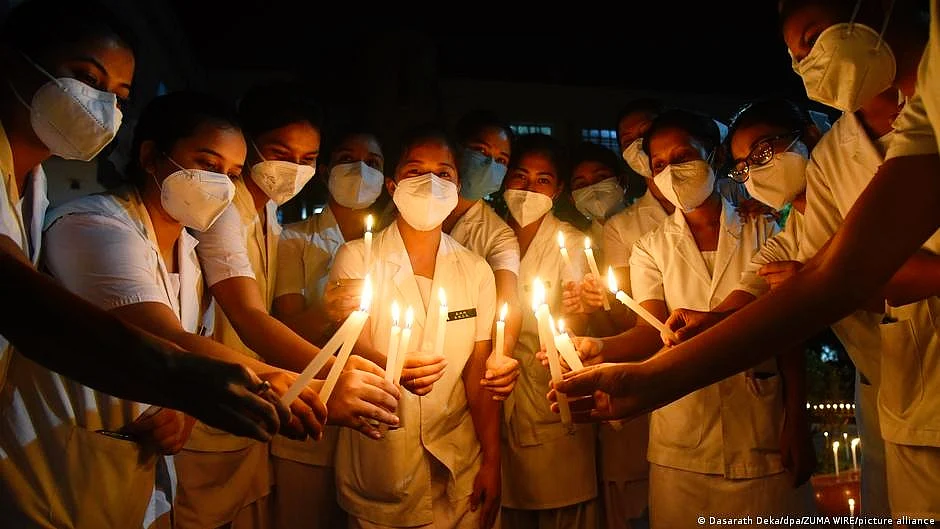No lessons learned after Covid crisis: Indian Medical Association chief
IMA chief Dr R.V. Asokan also describes government's Ayushman Bharat health insurance scheme as "poorly structured and underfunded"

Terming health an “orphan”, Indian Medical Association (IMA) chief Dr R.V. Asokan says no lessons have been learned after the Covid crisis, and it doesn’t figure as a top priority for political parties with everyone in the “all is well” zone.
In an interaction with PTI editors, Asokan also described the government's flagship Ayushman Bharat health insurance scheme as "poorly structured and underfunded", and called for increasing investments in the health sector.
"Health is an orphan. Nobody wants to talk about health even after the Covid pandemic, where it was acutely felt even as a matter of internal security. We have not learned any lessons. We continue to be in the same 'all is well' zone," he said.
“Health sadly does not figure among the top priorities of political parties,” Asokan said in response to a question on attention to the sector during the ongoing Lok Sabha elections.
Dwelling at length on the Ayushman Bharat Pradhan Mantri Jan Arogya Yojana (AB-PMJAY) scheme, Asokan said the scheme had "great vision” and there were great expectations from it. “But it was structured poorly. And underfunded to the extent that it will collapse. Why I say this is because it was envisioned by the prime minister for people below the poverty line, but was perhaps structured by the NITI Aayog and bureaucrats," Asokan said.
"The care in government hospitals is already free. So what is new that the patient gets? Whether it is routed through a government hospital or Ayushman Bharat, the patient gets nothing new. So the goodwill that had to be generated in the public did not develop. That political dividend didn't occur.
"As per the calculations that they themselves have provided to the nation, we need at least Rs 1.6 lakh crore annually to run that scheme. It started with Rs 6,800 crore. And (the budget) is now Rs 12,000 crore," he stated.
The IMA president said they would like the government to be in charge of health, invest in public hospitals, and in public infrastructure and public human resources. "Whatever has been invested in health is too inadequate. People spend around 3.9 per cent of the GDP on health. The Central and state governments put together spend 1.1 to 1.3 per cent of the GDP, which is inadequate," he said.
He cited a 2011 high-level expert group report on universal health coverage for India by the erstwhile Planning Commission to say that the government has to ensure a basic package for all citizens, whether poor or rich. “Beyond that, they can buy care,” Asokan explained.
The same document stated that the government should buy strategically from the private sector for people below the poverty line.
"And the 2021 report titled 'Health Insurance for India’s Missing Middle' by NITI Aayog said 10 per cent of Indians can pay for themselves, 25 per cent will be taken care of by the Ayushman Bharat scheme and the rest of them, numbering around 90 crore, are being thrown to private health insurance. "After 10 years of the Planning Commission document, throwing us to the insurance industry is not acceptable," he said.
However, in his view, India's health model is better than that of advanced economies such as the US and UK.
"In the United States... 20 per cent of the population does not have care after spending 15 per cent of their GDP. Insurance is a failed model. The US model of insurance will not suit us. During Covid also, we did better than these affluent countries because of the steel frame of the public health system we have. The poor had somewhere to go," he said.
Making a comparison with UK’s National Health Service (NHS), Asokan said India is different. “Here in India you are able to meet a doctor in most places... This is not true of the West... And you cannot meet a doctor very easily. Today, we have done that at a much lower cost.
"Our contention is that do not lose what we have. We are the best model. This is being done in India in spite of everything due to the middle sector of small and medium hospitals. You have the government sector, you have the for-profit corporate sector, but in between, there are small medium hospitals run by doctors throughout the country.”
These, he said, were mostly family enterprises at the doorstep.
Stressing that the entrepreneurship of the medical profession in India is unique and an asset that should be preserved, he said regulations coming up now are eliminating this sector.
Follow us on: Facebook, Twitter, Google News, Instagram
Join our official telegram channel (@nationalherald) and stay updated with the latest headlines